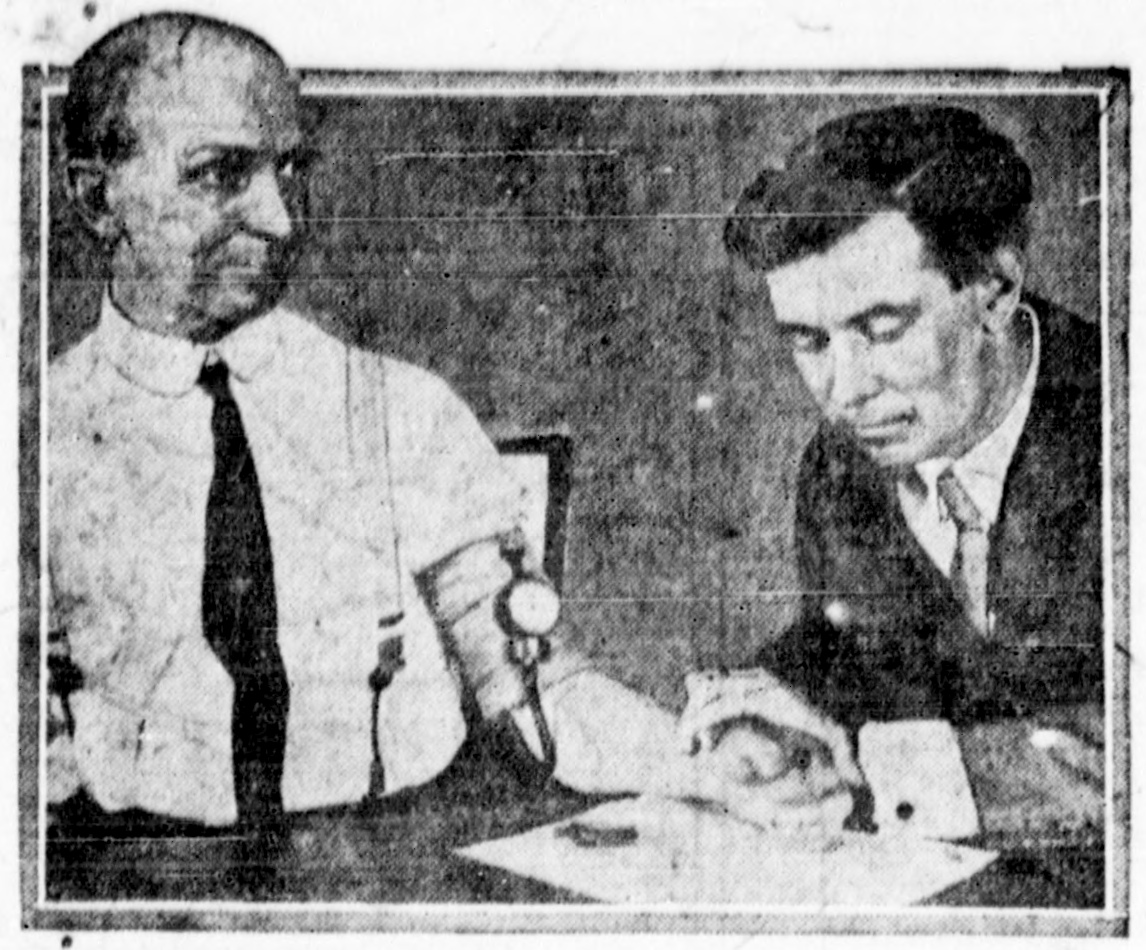|
DISC Assessment
DISC assessments are behavioral self-assessment tools based on the 1928 DISC emotional and behavioral theory of psychologist William Moulton Marston. The tools are designed to predict job performance. However, the scientific validity of DISC has been contested and is by some considered to be a pseudoscience. DISC is an acronym, the theory describing personality through four claimed central traits: dominance, inducement, submission, and compliance. Types The first self-assessment based on Marston's DISC theory was created in 1956 by Walter Clarke, an industrial psychologist. In 1956, Clarke created the Activity Vector Analysis, a checklist of adjectives on which he asked people to indicate descriptions that were accurate about themselves. This self-assessment was intended for use in businesses needing assistance in choosing qualified employees. Merenda, Peter F., and Clarke published their findings on a new instrument in the January 1965 issue of the ''Journal of Clinical Psycho ... [...More Info...] [...Related Items...] OR: [Wikipedia] [Google] [Baidu] |
William Moulton Marston
William Moulton Marston (May 9, 1893 – May 2, 1947), also known by the pen name Charles Moulton (), was an American psychologist who, with his wife Elizabeth Holloway Marston, Elizabeth Holloway, invented an early prototype of the lie detector. He was also known as a self-help author and American comic book, comic book writer who created the character Wonder Woman. Two women, his wife Elizabeth Holloway Marston, and their Polyamory, polyamorous Significant other, life partner, Olive Byrne, greatly influenced Wonder Woman's creation. He was inducted into the The Will Eisner Award Hall of Fame, Comic Book Hall of Fame in 2006. Biography Early life and career Marston was born in the Cliftondale section of Saugus, Massachusetts, the son of Annie Dalton (née Moulton) and Frederick William Marston. Marston was educated at Harvard University, graduating Phi Beta Kappa and receiving his B.A. in 1915, an LL.B. in 1918, and a PhD in Psychology in 1921. While a student at Harvard, Mars ... [...More Info...] [...Related Items...] OR: [Wikipedia] [Google] [Baidu] |
Pseudoscience
Pseudoscience consists of statements, beliefs, or practices that claim to be both scientific and factual but are incompatible with the scientific method. Pseudoscience is often characterized by contradictory, exaggerated or falsifiability, unfalsifiable claims; reliance on confirmation bias rather than rigorous attempts at refutation; lack of openness to Peer review, evaluation by other experts; absence of systematic practices when developing Hypothesis, hypotheses; and continued adherence long after the pseudoscientific hypotheses have been experimentally discredited. The demarcation problem, demarcation between science and pseudoscience has scientific, philosophical, and political implications. Philosophers debate the nature of science and the general criteria for drawing the line between scientific theory, scientific theories and pseudoscientific beliefs, but there is general agreement on examples such as ancient astronauts, climate change denial, dowsing, evolution denial, ... [...More Info...] [...Related Items...] OR: [Wikipedia] [Google] [Baidu] |
Journal Of Clinical Psychology
The ''Journal of Clinical Psychology'' is a monthly peer-reviewed medical journal covering psychological research, assessment, and practice. It was established in 1945. It covers research on psychopathology, psychodiagnostics, psychotherapy, psychological assessment and treatment matching, clinical outcomes, clinical health psychology, and behavioral medicine. Each year, four of the monthly issues are dedicated to ''In Session'', a section that focuses on clinical issues that may be encountered by psychotherapists. ''In Session'' is editorially independent from the main journal. From 1995 - 1999 it was published as a separate journal titled, ''In Session: Psychotherapy in Practice''. From time to time, the journal publishes special issues, containing a selection of articles related to a single particularly timely or important theme. According to the ''Journal Citation Reports'', the journal has a 2011 impact factor of 2.116, ranking it 31st out of 109 journals in the category "Ps ... [...More Info...] [...Related Items...] OR: [Wikipedia] [Google] [Baidu] |
John Geier
John George Geier, III (Flint, Michigan; January 24, 1934 – September 26, 2009) was an American psychologist who worked extensively on the DISC assessment systems, which improve work/life performance. Dr. Geier had a 40-year career in the assessment process and was known as a pioneer and founder of personnel selection, training and research, and a leader of human assessment. During his career, he developed numerous assessment tools, including the DiSC Personal Profile System, and the Personality Factor Profile, used for more than 50 million people around the world and translated to more than 30 different languages. Family background and early years John G. Geier III was born to John George Geier, Jr. (1900–1967) and Irene E. Bock (1911–1978). John III's father was of Volga-German extraction, and Irene was the daughter of Jewish Jews ( he, יְהוּדִים, , ) or Jewish people are an ethnoreligious group and nation originating from the Israelites Israelite ... [...More Info...] [...Related Items...] OR: [Wikipedia] [Google] [Baidu] |
Validity (statistics)
Validity is the main extent to which a concept, conclusion or measurement is well-founded and likely corresponds accurately to the real world. The word "valid" is derived from the Latin validus, meaning strong. The validity of a measurement tool (for example, a test in education) is the degree to which the tool measures what it claims to measure. Validity is based on the strength of a collection of different types of evidence (e.g. face validity, construct validity, etc.) described in greater detail below. In psychometrics, validity has a particular application known as test validity: "the degree to which evidence and theory support the interpretations of test scores" ("as entailed by proposed uses of tests"). It is generally accepted that the concept of scientific validity addresses the nature of reality in terms of statistical measures and as such is an epistemological and philosophical issue as well as a question of measurement. The use of the term in logic is narrower, relati ... [...More Info...] [...Related Items...] OR: [Wikipedia] [Google] [Baidu] |
Reliability (statistics)
In statistics and psychometrics, reliability is the overall consistency of a measure. A measure is said to have a high reliability if it produces similar results under consistent conditions:"It is the characteristic of a set of test scores that relates to the amount of random error from the measurement process that might be embedded in the scores. Scores that are highly reliable are precise, reproducible, and consistent from one testing occasion to another. That is, if the testing process were repeated with a group of test takers, essentially the same results would be obtained. Various kinds of reliability coefficients, with values ranging between 0.00 (much error) and 1.00 (no error), are usually used to indicate the amount of error in the scores." For example, measurements of people's height and weight are often extremely reliable.The Marketing Accountability Standards Board (MASB) endorses this definition as part of its ongoinCommon Language: Marketing Activities and Metrics Pr ... [...More Info...] [...Related Items...] OR: [Wikipedia] [Google] [Baidu] |
Test-retest Reliability
Repeatability or test–retest reliability is the closeness of the agreement between the results of successive measurements of the same measure, when carried out under the same conditions of measurement. In other words, the measurements are taken by a single person or instrument on the same item, under the same conditions, and in a short period of time. A less-than-perfect test–retest reliability causes test–retest variability. Such variability can be caused by, for example, intra-individual variability and inter-observer variability. A measurement may be said to be ''repeatable'' when this variation is smaller than a pre-determined acceptance criterion. Test–retest variability is practically used, for example, in medical monitoring of conditions. In these situations, there is often a predetermined "critical difference", and for differences in monitored values that are smaller than this critical difference, the possibility of variability as a sole cause of the difference ma ... [...More Info...] [...Related Items...] OR: [Wikipedia] [Google] [Baidu] |
Criterion Validity
In psychometrics, criterion validity, or criterion-related validity, is the extent to which an operationalization of a construct, such as a test, relates to, or predicts, a theoretical representation of the construct—the criterion. Criterion validity is often divided into concurrent and predictive validity based on the timing of measurement for the "predictor" and outcome. Concurrent validity refers to a comparison between the measure in question and an outcome assessed at the same time. '' Standards for Educational & Psychological Tests'' states, "concurrent validity reflects only the status quo at a particular time." Predictive validity, on the other hand, compares the measure in question with an outcome assessed at a later time. Although concurrent and predictive validity are similar, it is cautioned to keep the terms and findings separated. "Concurrent validity should not be used as a substitute for predictive validity without an appropriate supporting rationale."American Psycho ... [...More Info...] [...Related Items...] OR: [Wikipedia] [Google] [Baidu] |
DISC Wheel
Disk or disc may refer to: * Disk (mathematics), a geometric shape * Disk storage Music * Disc (band), an American experimental music band * ''Disk'' (album), a 1995 EP by Moby Other uses * Disk (functional analysis), a subset of a vector space * Disc (galaxy), a disc-shaped group of stars * ''Disc'' (magazine), a British music magazine * Disc harrow, a farm implement * DISC assessment, a group of psychometric tests * Death-inducing signaling complex * Defence Intelligence and Security Centre or Joint Intelligence Training Group, the headquarters of the Defence College of Intelligence and the British Army Intelligence Corps * Delaware Independent School Conference, a high-school sports conference * , a Turkish trade union centre * Domestic international sales corporation, a provision in U.S. tax law * Dundee International Sports Centre, a sports centre in Scotland * International Symposium on Distributed Computing, an academic conference * Intervertebral disc, a cartila ... [...More Info...] [...Related Items...] OR: [Wikipedia] [Google] [Baidu] |
Personality Tests
A personality test is a method of assessing human personality constructs. Most personality assessment instruments (despite being loosely referred to as "personality tests") are in fact introspective (i.e., subjective) self-report questionnaire (Q-data, in terms of LOTS data) measures or reports from life records (L-data) such as rating scales. Attempts to construct actual performance tests of personality have been very limited even though Raymond Cattell with his colleague Frank Warburton compiled a list of over 2000 separate objective tests that could be used in constructing objective personality tests. One exception however, was the Objective-Analytic Test Battery, a performance test designed to quantitatively measure 10 factor-analytically discerned personality trait dimensions. A major problem with both L-data and Q-data methods is that because of item transparency, rating scales and self-report questionnaires are highly susceptible to motivational and response distortion ran ... [...More Info...] [...Related Items...] OR: [Wikipedia] [Google] [Baidu] |
1965 Introductions
Events January–February * January 14 – The Prime Minister of Northern Ireland and the Taoiseach of the Republic of Ireland meet for the first time in 43 years. * January 20 ** Lyndon B. Johnson is Second inauguration of Lyndon B. Johnson, sworn in for a full term as President of the United States. ** Indonesian President Sukarno announces the withdrawal of the Indonesian government from the United Nations. * January 30 – The Death and state funeral of Winston Churchill, state funeral of Sir Winston Churchill takes place in London with the largest assembly of dignitaries in the world until the 2005 funeral of Pope John Paul II. * February 4 – Trofim Lysenko is removed from his post as director of the Institute of Genetics at the Russian Academy of Sciences, Academy of Sciences in the Soviet Union. Lysenkoism, Lysenkoist theories are now treated as pseudoscience. * February 12 ** The African and Malagasy Republic, Malagasy Common Organization ('; OCA ... [...More Info...] [...Related Items...] OR: [Wikipedia] [Google] [Baidu] |


.png)